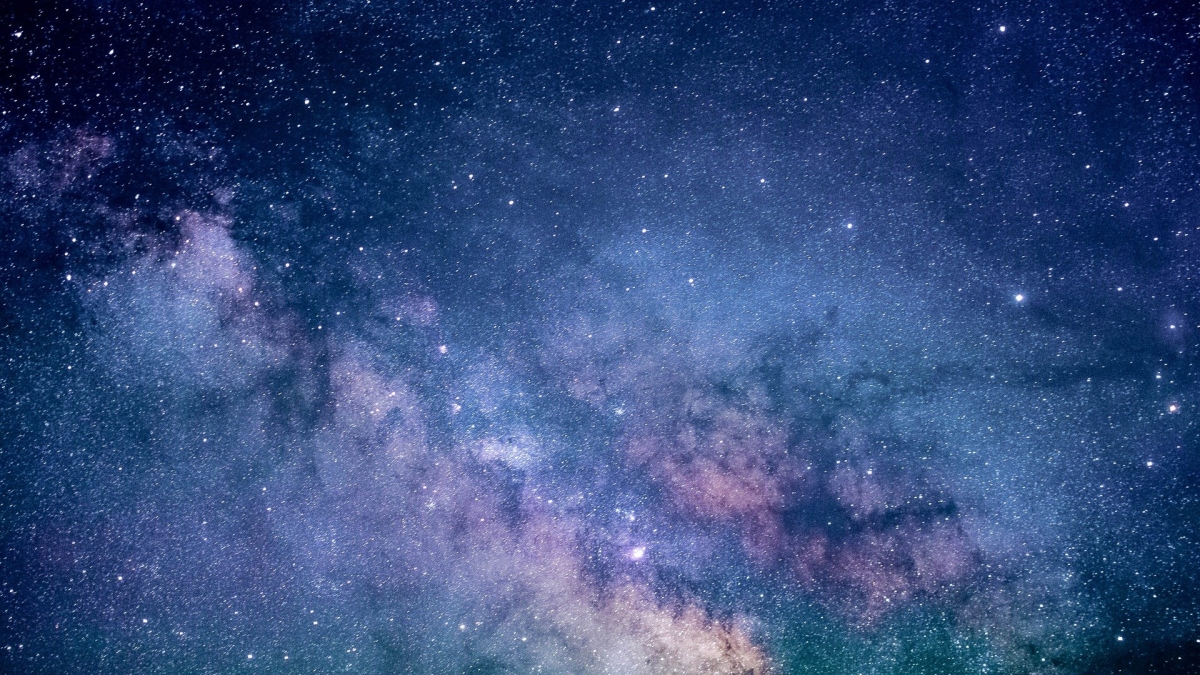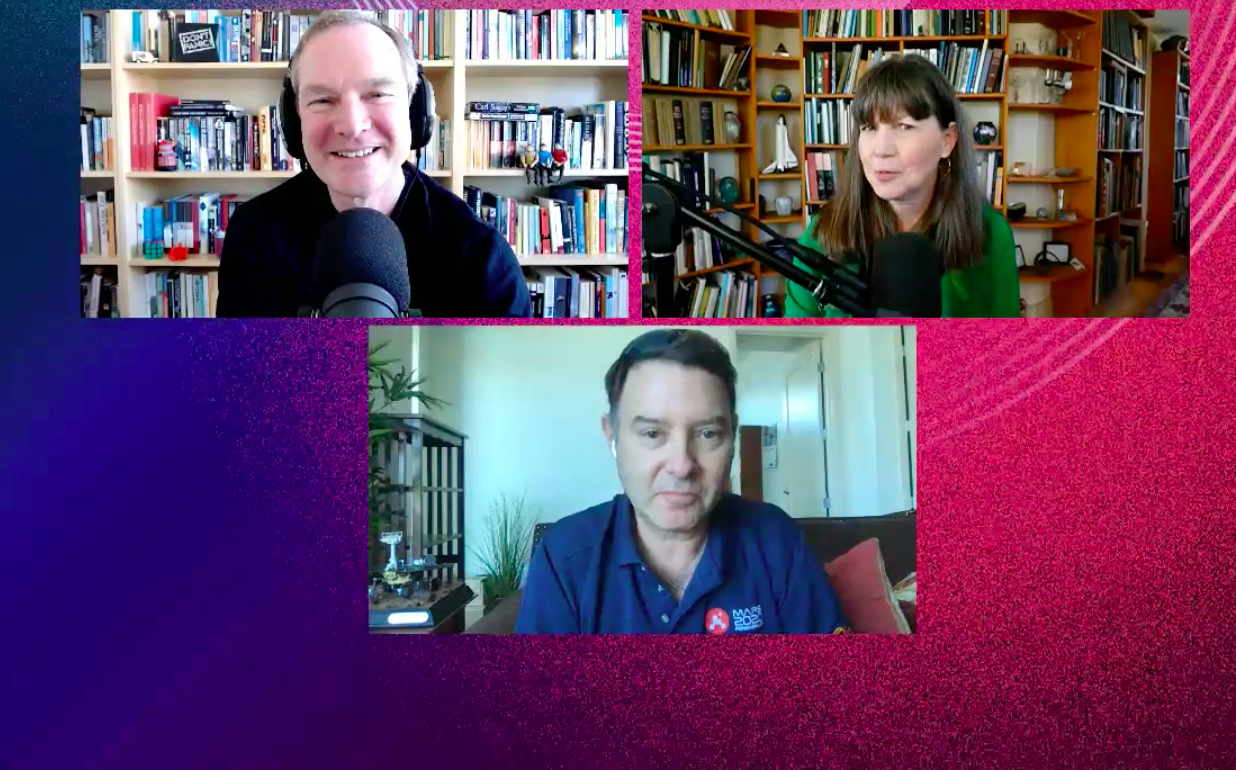ASU's 'Mission: Interplanetary' podcast hosts talk about the future of space exploration

On Feb. 18, the Perseverance rover landed on Mars to search for signs of ancient life and collect samples to return to Earth. The same month, Elon Musk’s SpaceX announced plans for the world’s first all-civilian mission to space. We are in a revolutionary era of space exploration, and humans are becoming an interplanetary species. As we continue to push the boundaries of space exploration, we must also contend with new sets of questions, challenges and opportunities that come with our ever-expanding reach. How can we effectively explore and share the exciting challenges of designing positive space futures?
A new podcast from Arizona State University’s Interplanetary Initiative and Slate, "Mission: Interplanetary," looks at those big questions and ponders the glimpses into the future that lie beyond the bounds of Earth. ASU’s Global Explorer in Residence Cady Coleman, a scientist, former United States Air Force colonel and retired NASA astronaut, hosts "Mission: Interplanetary" with Andrew Maynard, ASU’s associate dean of curricula and student success in the College of Global Futures. Together, Maynard and Coleman talk with innovators and thought-leaders and explore new ways of thinking and talking about the future of humanity as a spacefaring species.
“We’re interested in exploring the universe, and there’s really interesting people doing that,” said Coleman at the podcast’s launch event. “Something we made clear to our guests is that we are here to talk about what you want to talk about. Because there are some really big questions about exploring the universe, about what it means to be an interplanetary species.”

"Mission: Interplanetary" podcast hosts Andrew Maynard, top left, and Cady Coleman, top right, talk to Professor Jim Bell from ASU's School of Earth and Space Exploration about his team's role in the recent landing of the Mars rover Perseverance.
The podcast began its exploration of space with special guest Jim Bell, a professor in ASU's School of Earth and Space Exploration. Bell joined the new podcast hosts to discuss his role as principal investigator on Mastcam-Z, the stereoscopic imaging instrument on the latest Mars rover, Perseverance.
“I’ll never forget when I came to you to try and learn more about Perseverance,” said Coleman to Bell. “The first thing you said to me was, ‘Cady, this is not your grandmother’s Mars rover. This is not your mother’s Mars rover. This is your Mars rover, and your children’s Mars rover. Everyone is going to be able to see and be on Mars with these cameras and the data we are bringing back.'”
For Bell, Mastcam-Z and Perseverance are bringing humanity that much closer to an interplanetary existence.
“We don’t want to just experience the place remotely, viscerally, through this robotic avatar and see Mars that way. We actually want to see Mars ourselves, because we are going to bring these samples back to Earth,” Bell said. “There’s been 47 missions sent to Mars before Perseverance since 1960. None of them have been designed to bring anything back. This is the first, and that’s why this is different. We’re collecting those samples.”
The podcast also includes a special “Martian Weather Report” with Tanya Harrison, a Mars expert and self-proclaimed “professional Martian.” Harrison believes that humanizing space exploration through public discussion is critical for building public support.
“Science is often presented as this very sterile thing,” said Harrison. “It’s just facts and you don’t really get to see the people behind it. You don’t get to see how much we care about everything we do, and how much of ourselves we pour into this. I think it’s very similar to what you see with artists that create art. I want people to see that scientists are also humans and we have emotion, and we love this stuff so much. I want people to be a part of that.”
The podcast has already planned a long list of future guests to discuss big questions around the future of space. Co-hosts Coleman and Maynard are most excited about combining their different perspectives about imagining, designing and building the future of humans in space.
“Talking to people who are looking into the future and seeing what future space travel will look like,” Coleman said. “I feel like I’m the bridge to talk a little bit of the reality of now. Because they’re looking further, it’s nice to have that anchor. Then Andrew looks at it from a completely different point of view, with very accurate physics.”
“What is really cool, at least for me, is I get to hang out with a real astronaut,” Maynard said. “Cady’s done things I couldn’t even dream of.”
"Mission: Interplanetary’s" first episode aired on March 23 with ASU Professor Lindy Elkins-Tanton, the principal investigator of NASA’s Psyche mission. Tanton discussed asteroid 16 Psyche, a unique metal world that may hold secrets to the history of our own planet.
Join ASU’s Coleman and Maynard on "Mission: Interplanetary" each week on Spotify, Apple Podcasts, Tune-in and Stitcher.
More Science and technology

ASU professor breeds new tomato variety, the 'Desert Dew'
In an era defined by climate volatility and resource scarcity, researchers are developing crops that can survive — and thrive — under pressure.One such innovation is the newly released tomato variety…

Science meets play: ASU researcher makes developmental science hands-on for families
On a Friday morning at the Edna Vihel Arts Center in Tempe, toddlers dip paint brushes into bright colors, decorating paper fish. Nearby, children chase bubbles and move to music, while…

ASU water polo player defends the goal — and our data
Marie Rudasics is the last line of defense.Six players advance across the pool with a single objective in mind: making sure that yellow hydrogrip ball finds its way into the net. Rudasics, goalkeeper…

